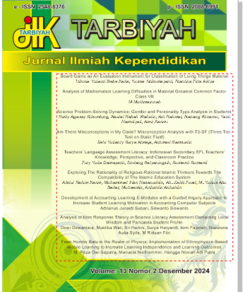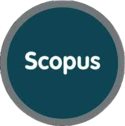Analysis of Item Response Theory in Science Literacy Assessment Containing Local Wisdom and Pancasila Student Profile
DOI:
https://doi.org/10.18592/tarbiyah.v13i2.13771Keywords:
asssessment, item response theory, local wisdom, pancasila student profile, science literacyAbstract
Science literacy assessment is critical because it helps measure people's understanding of scientific concepts and ensures the effectiveness of science education. This study aimed to identify the quality of the instrument based on item response theory in assessing high school physics science literacy. This instrument is found in particle dynamics material. This type of research is quantitative descriptive. The location of data collection was in three schools in Banjarmasin City. The sample was obtained by cluster random sampling. The validity of the Rasch program was obtained from the results of the fit order items compared to the MNSQ and ZSTD value criteria. The validity test and discriminatory power analysis results showed that three invalid questions had to be discarded. The results showed that the developed science literacy instrument had a level of difficulty in the middle, so the instrument was suitable for both high-ability and low-ability students. This study implies that this assessment can help students relate physics concepts to local culture, increasing the relevance of learning and producing students who are not only academically competent but also have social and cultural awareness.References
Afnan, R., Munasir, M., Budiyanto, M., & Aulia, M. I. R. (2023). The Role of Scientific Literacy Instruments For Measuring Science Problem Solving Ability. IJORER : International Journal of Recent Educational Research, 4(1), 45–58. https://doi.org/10.46245/IJORER.V4I1.271
Ali, L. U., & Zaini, M. (2023). Development of Interactive e-modules Based on Local Wisdom Using Android to Improve Students’ Higher Order Thinking Skills (HOTS). Jurnal Penelitian Pendidikan IPA, 9(11), 10091–10100. https://doi.org/10.29303/JPPIPA.V9I11.4515
Alifiyah, C. N., Parno, P., & Kusairi, S. (2020). Efektivitas Penggunaan UKBM Terhadap Literasi Sains Materi Alat Optik Dalam Model PjB-STEM Dengan Asesmen Formatif Pada Siswa Kelas XI MIA SMA Negeri 9 Malang. Briliant: Jurnal Riset Dan Konseptual, 5(4), 679. https://doi.org/10.28926/briliant.v5i4.515
Alti, R. P., Lufri, L., Helendra, H., & Yogica, R. (2021). Instrumen Asesmen Berbasis Literasi Sains Tentang Materi Keanekaragaman Hayati. Journal for Lesson and Learning Studies. https://ejournal.undiksha.ac.id/index.php/JLLS/article/view/34270
Aulia, D. M., Parno, & Kusairi, S. (2021a). Pengaruh E-module Berbasis TPACK-STEM terhadap Literasi Sains Alat Optik dengan Model PBL-STEM Disertai Asesmen Formatif. Jurnal Riset Pendidikan Fisika, 6(1), 7–12.
Aulia, D. M., Parno, P., & Kusairi, S. (2021b). Pengaruh E-Modul Berbasis TPACK-STEM terhadap Literasi Sains Alat Optik dengan Model PBL-STEM Disertai Asesmen Formatif. Jurnal Riset Pendidikan Fisika, 6(1), 7–12. http://journal2.um.ac.id/index.php/jrpf/article/view/16404
Azwar, S. (2012). Reliabilitas dan validitas. Yogyakarta: Pustaka Pelajar.
Bramastia, B., Suciati, S., Nugraheni, F. S. A., Sari, M. W., Wati, I. K., Antrakusuma, B., & Masithoh, D. F. (2023). The Effectiveness of EthnoSTEM-Based Science Learning to Improve Junior High School Students’ Science Literacy Ability. Jurnal Penelitian Pendidikan IPA, 9(SpecialIssue), 332–337. https://doi.org/10.29303/JPPIPA.V9ISPECIALISSUE.5710
Chan, S. W., Ismail, Z., & Sumintono, B. (2013). A Rasch Model Analysis on Secondary Students’ Statistical Reasoning Ability in Descriptive Statistics. International Conference on Innovation, Management, and Technology Research.
Chasanah, N., Widodo, W., & Suprapto, N. (2022). Pengembangan Instrumen Asesmen Literasi Sains Untuk Mendeskripsikan Profil Peserta Didik. In PENDIPA Journal of Science Education. ejournal.unib.ac.id. https://ejournal.unib.ac.id/index.php/pendipa/article/download/20225/9465
Dewantara, D., Mahtari, S., Misbah, M., & Haryandi, S. (2019). Student Responses in Biology Physics Courses Use Worksheets Based on Scientific Literacy. Prisma Sains : Jurnal Pengkajian Ilmu Dan Pembelajaran Matematika Dan IPA IKIP Mataram, 7(2), 192–197.
Dewi, H., Negeri, S., Tumpang, K., Malang, J., & Timur, I. (2023). Penerapan Model GI-GDL untuk Meningkatkan Ketuntasan Belajar Fisika dalam Proyek Penguatan Profil Pelajar Pancasila. Ideguru: Jurnal Karya Ilmiah Guru, 8(2), 328–336. https://doi.org/10.51169/IDEGURU.V8I2.519
Fitri. (2007). Analisis Validitas dan Reliabilitas Instrume Kinerja Akuntan Menggunakan Pendekatan Rasch Model. Akutansi Peradaban, III(1).
Hidayat, R., M, A. S., & Dewantara, D. (2021). The development of electronic teaching materials on linear impulse and linear momentum to improve students’ scietific literacy. Journal of Physics: Conference Series, 2104.
Huda, A. A. S., & Khairina, G. P. (2023). Non-Cognitive Diagnostic Assessment of Class 7 Islamic Education Learning at Junior High School. Tarbiyah : Jurnal Ilmiah Kependidikan, 12(2), 127–134. https://doi.org/10.18592/TARBIYAH.V12I2.10973
Huda, N., Sari, N. P., & Makaria, E. C. (2024). Perkembangan Kemampuan Bernalar Kritis Berdasarkan Teori Kognitif Agar Terwujudnya Profil Pelajar Pancasila. Jurnal Pelayanan Bimbingan Dan Konseling, 6(4). https://doi.org/10.20527/JPBK.2023.6.4.11589
Ismail, S., Suhana, S., & Zakiah, Q. Y. (2021). Analisis Kebijakan Penguatan Pendidikan Karakter Dalam Mewujudkan Pelajar Pancasila Di Sekolah. Jurnal Manajemen Pendidikan Dan Ilmu Sosial, 2(1), 76–84. https://dinastirev.org/JMPIS/article/view/388
Khusniati, M., Heriyanti, A. P., Aryani, N. P., Fariz, T. R., & Harjunowibowo, D. (2023). Indigenous science constructs based on Troso woven fabric local wisdom: a study in ethnoscience and ethnoecology: Research Article. Journal of Turkish Science Education, 20(3), 549–566. https://doi.org/10.36681/tused.2023.031
M Wati, M. M. (2021). The content validity of the assessment instrument on the characters of wasaka in wetland environment physics learning. Journal of Physics: Conference Series, 1760.
Mansur, R. (2008). Penilaian Hasil Belajar. Wacana Prima.
Matondang, Z. (2009). Validitas dan Reliabilitas Suatu Instrumen Penelitian. Jurnal Tabularasa, 6(1), 87–97.
Nuraini, L., Elisa, E., Istighfarini, E. T., Prabandari, A. M., Latifa, H., Widi, L., & Hamidah, I. (2024). Diseminasi Modul Digital KOFIJATRA untuk Mendukung Penguatan Profil Pelajar Pancasila Pada Guru MGMP Fisika SMA. Madaniya, 5(2), 647–655. https://doi.org/10.53696/27214834.812
Purwanto, P. (2016). Evaluasi hasil belajar. Pustaka Pelajar.
Putra, D. S., Irawan, A., Yanto, J. P., Putra, M. M., Adli, S., Dewi, U. P., & Nasih, N. R. (2020). Relationship of Attitude with Student Learning Environment Toward Physics. Tarbiyah : Jurnal Ilmiah Kependidikan, 9(2), 78–86. https://doi.org/10.18592/TARBIYAH.V9I2.3522
Rusmansyah, R., Leny, L., & Sofia, H. N. (2023). Improving Students’ Scientific Literacy and Cognitive Learning Outcomes through Ethnoscience-Based PjBL Model. Journal of Innovation in Educational and Cultural Research, 4(1), 1–9. https://doi.org/10.46843/JIECR.V4I1.382
Santika, I. G. N. (2020). Menggali dan Menemukan Roh Pancasila Secara Kontekstual. Penerbit Lakeisha.
Sari, E. N., Miriam, S., & Suyidno, S. (2023a). Developing Students’ Scientific Literacy Skills in Driving Schools Through the Use of Local Wisdom-Based Physics Lesson E-module. Berkala Ilmiah Pendidikan Fisika, 11(1), 9–19. https://doi.org/10.20527/bipf.v11i1.14095
Sari, E. N., Miriam, S., & Suyidno, S. (2023b). Developing Students’ Scientific Literacy Skills in Driving Schools Through the Use of Local Wisdom-Based Physics Lesson E-module. Berkala Ilmiah Pendidikan Fisika, 11(1), 9. https://doi.org/10.20527/bipf.v11i1.14095
Setiawan Putra, D., Irawan, A., Putra Yanto, J., Putra, M. M., Adli, S., Dewi, U. P., & Nasih, R. (2018). Uji Validitas dan Reliabilitas Instrumen Penelitian Kuantitatif. Tarbiyah : Jurnal Ilmiah Kependidikan, 7(1), 78–86. https://doi.org/10.18592/TARBIYAH.V7I1.2100
Setiawan Putra, D., Irawan, A., Putra Yanto, J., Putra, M. M., Adli, S., Dewi, U. P., & Nasih, R. (2021). Empirical Test of Content Validity and Construct Validity of Mathematical Self-Efficacy Scale. Tarbiyah : Jurnal Ilmiah Kependidikan, 10(2), 64–72. https://doi.org/10.18592/TARBIYAH.V10I2.4341
Sholihah, A., Syahmani, S., & Suyidno, S. (2023). The Effectiveness of STEM Integrated Problem-Based Learning in Enhancing Student Science Literacy on Temperature and Heat Materials. Jurnal Ilmiah Pendidikan Fisika, 7(1), 1–9. https://doi.org/10.20527/JIPF.V7I1.5639
Siswanto, J., Mahtari, S., Febriani, W., Sari, E., Lambung Mangkurat, U., Brigjen Hasan Basri, J. H., Utara, B., Banjarmasin, K., & Selatan, K. (2023). The Barriers to Developing Students’ Scientific Literacy in Learning Physics of Quantities and Measurements. Jurnal Pendidikan Sains Indonesia, 11(2), 206–220. https://doi.org/10.24815/JPSI.V11I2.27767
Suharsono, Y., & Istiqomah. (2014). Validitas Dan Reliabilitas Skala Self-Efficacy. Jurnal Ilmiah Psikologi Terapan, 02(01), 144–151. http://ejournal.umm.ac.id/index.php/jipt/article/view/1776
Sumintono, B., & Widhiarso, W. (2015). Aplikasi Pemodelan Rasch pada Assesment Pendidikan. Trim Komunikata.
Syafitri, Y. (2023). Need Analysis for Development of Physics E-Module Integrated with Critical Reading to Enhance Critical Thinking and Scientific Literacy in Senior High School. Jurnal Penelitian Pendidikan IPA, 9(10), 8065–8069. https://doi.org/10.29303/JPPIPA.V9I10.4976
Wati, M., Husna, A., Miriam, S., & Mahtari, S. (2018). Developing Cognitive Instruments Based on Science Literacy on Sound Materials. 1st International Conference on Creativity, Innovation and Technology.
Wati, M., & Mahtari, S. (2017). Pengembangan Instrumen Kognitif Fisika Siswa SMP. Jurnal Penelitian Dan Pengkajian Ilmu Pendidikan: E-Saintika, 1(1).
Wati, M., Misbah, Rizki, M., Astuti, T. P., & Rizky, S. (2021). Analisis kebutuhan pengembangan instrumen karakter wasaka. Prosiding Seminar Nasional Lingkungan Lahan Basah, 6(April).
Wati, M., Supriyati, Y., & Margono, G. (2015). Development of Physics Prior Knowledge Instrument for Senior High School Students on Measurement and Vector subject. Proceeding of The 3rd International Postgraduate Conference in Science and Mathematics 2015(IPCSM’15).
Wel Ningsi, A., & Mahaputra Iskandar, A. (2023). Design and Validity of Student Worksheet Integrated Scientific Literacy for The Use of Physics Practicum KIT. Jurnal Penelitian Pendidikan IPA, 9(1), 384–389. https://doi.org/10.29303/JPPIPA.V9I1.2887
Widoyoko, E. P. (2019). Evaluasi program pembelajaran: panduan praktis bagi pendidik dan calon pendidik. Pustaka Belajar.
Widoyoko, S. E. P. (2017). Penilaian Hasil Pembelajaran di Sekolah. Pustaka Pelajar.
Wijayadi, A. W., Fitriyah, L. A., & Manasikana, O. A. (2023). Development of Four-Tier Instrument at First Intermediate Level Chemistry Concepts. Tarbiyah : Jurnal Ilmiah Kependidikan, 12(2), 149–157. https://doi.org/10.18592/TARBIYAH.V12I2.11399
Yusup, F. (2018). Uji Validitas dan Reliabilitas Instrumen Penelitian Kuantitatif. Jurnal Tarbiyah : Jurnal Ilmiah Kependidikan, 7(1), 17–23. https://doi.org/10.18592/tarbiyah.v7i1.2100
Downloads
Published
How to Cite
Issue
Section
License
Copyright (c) 2024 Dewi Dewantara, Mustika Wati, Sri Hartini, Surya Haryandi, Ismi Fajariah, Nuzuluna Aulia Syifa, M Riduan Fitri

This work is licensed under a Creative Commons Attribution 4.0 International License.
Authors retain copyright and grant the journal right of first publication with the work simultaneously licensed under a Creative Commons Attribution 4.0 International License that allows others to share the work with an acknowledgment of the work's authorship and initial publication in this journal.




